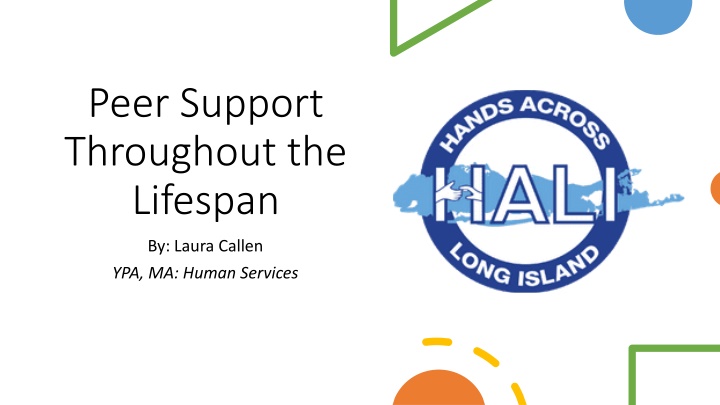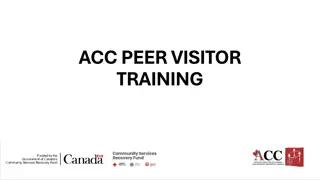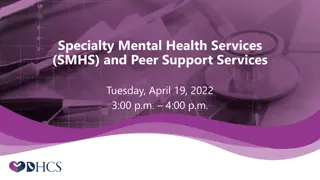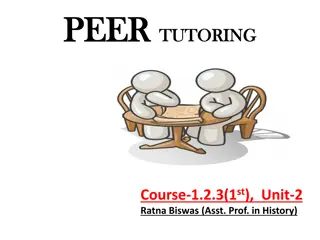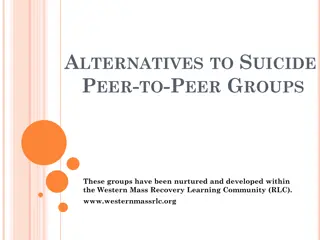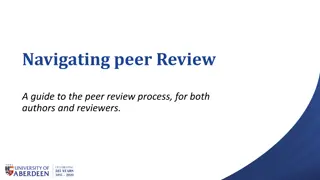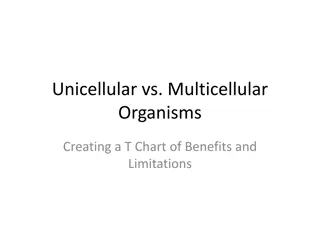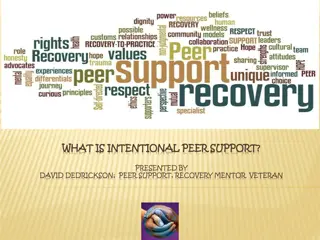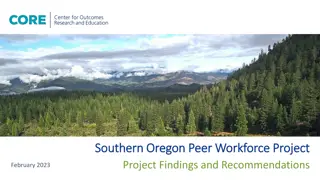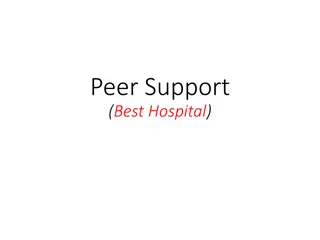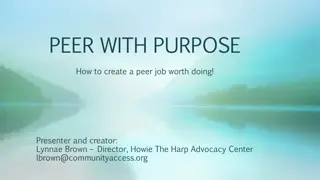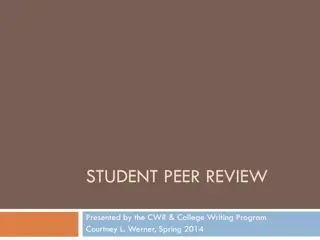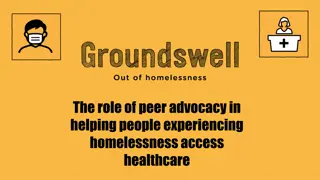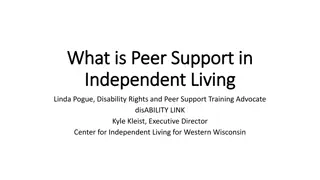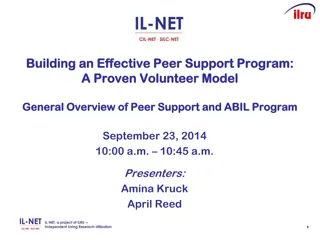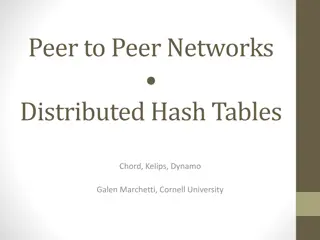Peer Support Across the Lifespan: A Comprehensive Guide
Exploring the impact of peer support at various stages of life, this comprehensive guide delves into the evolving role of advocates, the types of peer support available, and the significance of youth involvement. From adolescence to older adulthood, peer support remains flexible, transformative, and universal, offering insight into the diverse needs of individuals seeking assistance and empowerment.
Download Presentation

Please find below an Image/Link to download the presentation.
The content on the website is provided AS IS for your information and personal use only. It may not be sold, licensed, or shared on other websites without obtaining consent from the author.If you encounter any issues during the download, it is possible that the publisher has removed the file from their server.
You are allowed to download the files provided on this website for personal or commercial use, subject to the condition that they are used lawfully. All files are the property of their respective owners.
The content on the website is provided AS IS for your information and personal use only. It may not be sold, licensed, or shared on other websites without obtaining consent from the author.
E N D
Presentation Transcript
Peer Support Throughout the Lifespan By: Laura Callen YPA, MA: Human Services
Laura Callen I am 26, a certified YPA and currently working on my Certified Peer Specialist and CRPA credentials. I identify as a peer, a wife, a fur-mom and so much more! I was able to utilize my lived expertise to earn my Masters in Human Services to help others in my community live their best life Who am I?
Icebreaker At what age do you think self- advocacy starts? What does peer support mean to you? Have you noticed any changes in the way you perform advocacy throughout your career or life?
Let's start at the beginning... Though Peer Support historically has focused on adults ages 20-50, how does Peer Support affect other parts of life?
How Peer Support Stays Relevant
Peer Support is... Flexible Adaptable Universal Transformative
Think about what your needs were when you were an adolescent, are they the same as they are now? Do you foresee them changing as you continue to age? Peer Support as You Age Scan the QR code to access the poll or use the code 5455 5902!
Types of Peer Support Youth Peer Advocate Family Peer Advocate Certified Recovery Peer Advocate Certified Peer Specialist
Young people have been part of the peer support movement since the beginning Organized Youth Peer Support started in the late 1980s Became a Medicaid billable service in 2013 Specifically for transition aged youth, under 18 Youth Peer Advocate
Facilitate support groups Documentation according to agency policy Job expectations of a YPA Provide mutual support through established structured, strength-based, equitable relationships based on lived experience navigating a youth serving system Provide connections to outside community resources such as Youth clubs, recreational groups and other mental health supports etc... Empowers families to advocate through coaching, mentoring and modeling
Family peer support began late 1980s Family Peer Advocates became Medicaid billable in 1999 This service is for parents (biological, adopted or foster) of young people with behavioral and/or mental health challenges To become an FPA you must have lived experience in navigating the system for/with your child Family Peer Advocate
Promote needed changes in the systems that affect at-risk parents and children Provides peer support to families Job expectations of a FPA Meets documentation requirements in a timely manner based on agency policy Empowers families to advocate for Family Driven Care through coaching, mentoring and modeling Facilitates/co-facilitates meetings with families in the home, agency or community
NYS Medicaid billable in 2015 Focuses on providing support to those in recovery of Substance Use Disorders based on own lived experience In 2019, OASAS collaborated with community agencies to create 2 separate designations to add to the CRPA; CRPA-Y and CRPA-F These designations differ by type of lived experience... Certified Recovery Peer Advocate
Job expectations of a CRPA EDUCATING PROGRAM PARTICIPANTS ABOUT VARIOUS MODES OF RECOVERY WHILE ENCOURAGING THEM TO FIND WHAT WORKS FOR THEM RAISING AWARENESS OF EXISTING SOCIAL AND OTHER SUPPORT SERVICES LINKING PARTICIPANTS TO FORMAL RECOVERY SUPPORTS ASSISTING WITH APPLYING FOR BENEFITS, GOING TO MEDICAL APPOINTMENTS AND OTHER THINGS AS NEEDED THAT ARE SPECIFIED BY THE AGENCY OF EMPLOYMENT
Began in the 70s but was seen as early as the late 1800s in Europe Became Medicaid billable as early as 2001 Focuses on supporting those with Mental Health diagnosis maintain wellness; however it manifests to them Certified Peer Specialist
Job Expectations of a Certified Peer Specialist Act as a role model for clients to prove mental health recovery is possible Discuss shared lived experiences in a constructive/ supportive way Identify client needs and develop a recovery plan for those needs Teach and encourage clients to practice self-advocacy Connect clients with community support and resources
Why have the specialty? Peer Support for Older Adults What would it even look like? What programs, if any are already out there?
Programs currently out! Pennsylvania has COAPS or Certified Older Adult Peer Specialists which trains folks to navigate what wellness means as you age Broward County, FL has created Silver Inc, which provides peer support outreach NYS Office for the Aging--> Senior Companion Program; folks ages 55+ can work with older adults on various non- clinical needs The Academy of Peer Services, which conducts the NYCPS training has a specialty track for Older Adult Peers
Why have the specialty? as of 2024, approximately 19% of the world's population is over 65 years old Across the board people are living longer, which also means people with mental health challenges are also living longer. MHA conducted a study which found that most geriatric health teams do not include mental health services As the population ages the comprehensiveness of service provision needs increase!
Youth Peer Support Family Peer Support Remember... Collaboration is Key Certified Peer Specialist Peer Support Certifed Recovery Peer Advocate Peer Support movement
